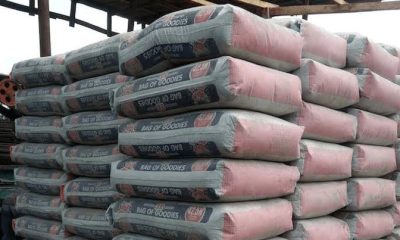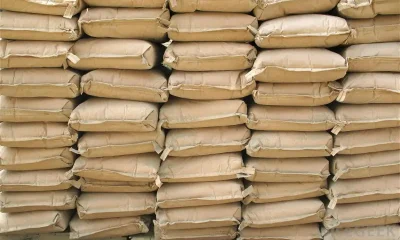Nigeria News
Cement Might Sell For ₦9,000 With FG’s Adoption Of Concrete Roads – Producers Warn

A stern warning has been given by the Cement Producers Association of Nigeria concerning the federal government’s proposal to switch to concrete roads.
The association said even though it is a great idea to switch to concrete roads in the country, the government should be warned about some of its consequences.
The group, in a statement jointly signed by the National Chairman, Prince David Iweta and National Secretary Chief Reagan Ufomba, on Sunday, said cement might sell for as high as ₦9,000 should the government continue with its proposal of concrete roads.
Naija News recall that the Work Minister, David Umahi, since assuming office, has advocated for a switch to concrete roads from asphalt technology, arguing that it last longer.
The cement producers association commended the minister for the move but warned against the repercussions that follow.
The group said, “Our findings from various parts of the country show that cement sells for as high as N6000 per bag in the rainy season. Our prediction is that it will sell for over ₦9,000 per bag in the dry season, especially with the pronouncement of the Honourable Minister of Works on cement technology and the marching order on housing by Mr. President if the government does not take proactive steps.
“While we commend the Honourable Minister’s position on cement-made roads, we warn of the dire consequences if the supply end is not properly addressed. In fact, it would amount to dereliction of duty not to intervene. And the time is now. To do otherwise is to continue in a worsening pipe dream that prices would suddenly drop on this essential input that will continue to drain the purse of Nigerians, render them homeless, encourage chaos between demand and supply, and worsen the infrastructure deficit it sets out to cure, and lead to an unprecedented price hike.
“We also call on the Honourable Minister of Works to lay more emphasis on the design criteria of roads that allow both cement technology and Asphalt pavement to run concurrently, in turn, will provide ample time for a smooth transition that allows contractors to invest in commensurate and requisite equipment and retooling. We must also, as a nation, regulate static and dynamic load traffic by introducing weighbridges at access points on our highways. Working in sync with contractors, and allied Ministries of Trade and Investment, Transport, Environment and Finance on realistic policy on cement is most desirable at this critical time.”
While proffering possible solutions to the results of the move, the group called on the government to lay more emphasis on road design that allows both cement technology and asphalt pavement to run concurrently and provide ample time for a smooth transition that allows contractors to invest in commensurate and requisite equipment and retooling.
It also asked the government to further the backward integration policy of the late Yar’adua administration, which was already bringing availability and affordability of cement in the country.
“There has been so much comment on cement and cement pricing of late. What our nation needs is cement that is available and affordable. And this cannot be achieved by mere wishes, faulty policies and programmes, without breaking the chain of monopoly and favouritisms. Nigerians are tired of waiting for a downturn in the price of cement and for decent and affordable housing.
“We call on the Tinubu government to permanently solve this perennial cement price hike problem by expanding participation in the sector with companies who have verifiable evidence of local investment, including greenfield licenses and quarrying. As a matter of fact, we call on the government to, more specifically, conclude the backward integration policy of the late Yar’adua administration, which was already bearing availability and affordability fruits.
“As patriots, it is our view that the government reintroduces backward integration policy and the conclusion of old ones. Consequently, the government cannot be seen to approbate and reprobate by deregulating issues of petroleum products and foreign exchange on one hand and regulating on pricing of cement, essential goods and services on another. There is a need for policy harmonisation and convergence between fiscal and monetary policies.
“Finally, we call on the government to urgently intervene in the foreign exchange market, intervene in restructuring bad loans of manufacturers, and review palliative modules. The cry for elusive FDI will be drastically reduced if all manufacturing concerns are revived. The government must be decisive in the kind of economic policies it intends to foist on the people,” the statement partly read.












